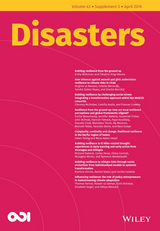
When information becomes action: drivers of individuals' trust in broadcast versus peer‐to‐peer information in disaster response
Martin-Shields, CharlesExternal Publications (2019)
published on Disasters 43 (3), 612-633
DOI: https://doi.org/10.1111/disa.12349
Information
Information and communications technology (ICT), primarily mobile telephones and social media, is increasingly important in crisis and disaster response in developing countries. This fact raises an important question: in an information environment that includes traditional media such as radio and television, who are the people that trust information from ICT enough to act on it during a disaster? Drawing on a case study of and original survey data from the island nation of the Independent State of Samoa, this paper yields insights into who uses new technologies, particularly mobile telephones, to make decisions at the local level during crises such as natural disasters, as well as the socio‐political factors that motivate their behaviour. The results add to the growing pool of knowledge on utilisation of ICT and new technologies in developing countries for disaster response, and provide practical information on the social and political factors that lead people to trust different information sources and media.

